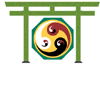
A Book of Little Traditions

|
minzoku NEO-shintô A Book of Little Traditions |
|
|
first edition
revised by Volkhvy – 10 / 24 / 2021 |
||
|
|
||
|
Introduction
This book is a much a lexicon as it is a reference. It is not intended to be read from start to finish; rather it is a resource for those interested in pursuing a minzoku NEO-shintô way. You will encounter a large number of Japanese terms, their written and spoken forms, and their derivations. While I encourage you to learn the Japanese language and culture, it is not absolutely required to practice minzoku NEO-shintô.
A brief word about the rômaji (Romanized Japanese) in this book: because Japanese does not have capitals, Japanese words are spelled in all lowercase (hiragana), and the Japanese pronunciation of foreign words are spelled in all uppercase (katakana). Also because many computer fonts lack the letters u & o with a macron, the long u & o are represented by û, ô, & sometimes oo.
What is minzoku NEO-shintô? The technical answer is, "A universalist approach to existential Japanese folk religion practices." But what does that mean? To break it down, universalist means it's open to anyone who's sincerely interested, it's not just for people of Japanese ancestory. Existential means it's based on personal experience, not on scripture or dogma. Folk religion means it's religion as practiced by the commons – the everyday people – and on a local basis; it's not religion as taught in the seminaries, universities, or on a national or international basis.
It is Existentialist; the mind-set of the Existentialist being: "Because I do these things I am a member."* It's not Essentialist, that is based on doctrines, creeds, scripture, or theology; the mind-set of an Essentialist being, "If I call myself a member, I must do these things."
* Note: Member of the set of people who practice a particular religion or culture. This is not the same thing as being a member of a specific community. Membership in the set of practitioners in no way entitles you to membership in any particular community; that needs to be negotiated between you and the community.
Please bear with me here. I'm still in the process of writing this book. Check back periodically for the most recent updates. Any errors in translation are mine. I'm working to improve my Japanese, but right now it's pretty much limited to the usual tourist stuff and obscure esoteric terms.
This version is and always will be a work in progress.
No profit is intended to be made from the use of this material as presented excepting that gained from an understanding of the information herein. Please respect this intent as you use it.
Copyright for original material herein is retained by the author(s). This material is intended as an aid for the practice of minzoku NEO-shintô. Practictioners may reproduce any original materials contained herein, under the fair use provision, as long as all attribution and copyright statements are included.
Who Am I and
Why Should Anyone Listen to Me? |
||
|
|